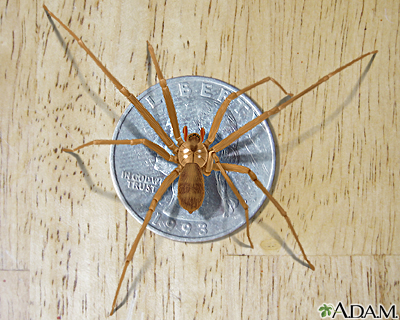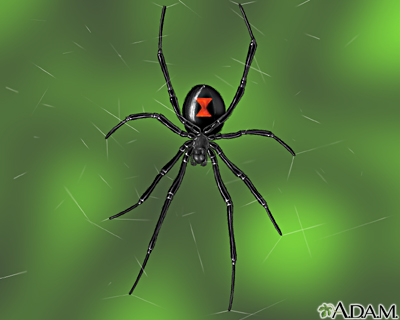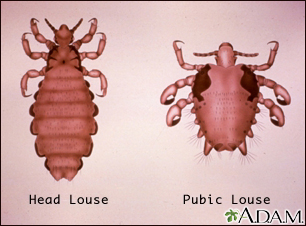Insect bites and stings
Bee sting; Bed bug bite; Bites - insects, bees, and spiders; Black widow spider bite; Brown recluse bite; Flea bite; Honey bee or hornet sting; Lice bites; Mite bite; Scorpion bite; Spider bite; Wasp sting; Yellow jacket sting
Insect bites and stings can cause an immediate skin reaction. The bite from fire ants and the sting from bees, wasps, and hornets are most often painful. Bites caused by mosquitoes, fleas, and mites are more likely to cause itching than pain.
Insect and spider bites cause more deaths from venom reactions than bites from snakes. Most deaths from insect bites are due to allergic reaction to the venom, rather than the toxins in the venom itself.
Images

























I Would Like to Learn About:
Considerations
In most cases, bites and stings can be easily treated at home.
Some people have extreme allergic reactions that require immediate treatment to prevent death.
Certain spider bites, such as the black widow or brown recluse, can cause serious illness or death. Most spider bites are harmless. If possible, bring the insect or spider that bit you with you when you go for treatment so it can be identified.
Symptoms
Symptoms depend on the type of bite or sting. They may include:
- Pain
- Redness
- Swelling
- Itching
- Burning
- Numbness
- Tingling
Some people have severe, life-threatening allergic reactions to bee stings or insect bites. This is called anaphylactic shock. This condition can occur very quickly and lead to rapid death if not treated quickly.
Symptoms of anaphylaxis can occur quickly and affect the whole body. They include:
- Abdominal pain or vomiting
- Chest pain
- Difficulty swallowing
- Difficulty breathing
- Face or mouth swelling
- Fainting or lightheadedness
- Rash or skin flushing
First Aid
For severe reactions, first check the person's airways and breathing. If necessary, call 911 or the local emergency number and begin rescue breathing and CPR. Then, follow these steps:
- Reassure the person. Try to keep them calm.
- Remove nearby rings and constricting items because the affected area may swell.
- Use the person's EpiPen or other emergency kit, if they have one. (Some people who have serious insect reactions carry it with them.)
- If appropriate, treat the person for signs of shock. Remain with the person until medical help arrives.
General steps for most bites and stings:
Remove the stinger by scraping the back of a credit card or other straight-edged object across the stinger. Do not use tweezers -- these may squeeze the venom sac and increase the amount of venom released.
Wash the site thoroughly with soap and water. Then, follow these steps:
- Place ice (wrapped in a washcloth) on the site of the sting for 10 minutes and then off for 10 minutes. Repeat this process.
- If necessary, take an antihistamine or apply creams that reduce itching.
- Over the next several days, watch for signs of infection (such as increasing redness, swelling, or pain).
Do Not
Use the following precautions:
- Do not apply a tourniquet.
- Do not give the person stimulants, aspirin, or other pain medicine unless prescribed by your health care provider.
When to Contact a Medical Professional
Call 911 or the local emergency number if someone with a sting has the following symptoms:
- Trouble breathing, wheezing, shortness of breath
- Swelling anywhere on the face or in the mouth
- Throat tightness or difficulty swallowing
- Feeling weak
- Turning blue
If you had a severe, bodywide reaction to a bee sting, your provider should send you to an allergist for skin testing and therapy. You should receive an emergency kit to carry with you wherever you go.
Prevention
You can help prevent insect bites and stings by doing the following:
- Avoid perfumes and floral-patterned or dark clothing when walking through woods, fields or other areas which are known to have large number of bees or other insects.
- Avoid rapid, jerky movements around insect hives or nests.
- Do not put hands in nests or under rotted wood where insects may gather.
- Use caution when eating outdoors, especially with sweetened beverages or in areas around garbage cans, which often attract bees.
Related Information
AnaphylaxisShock
Black widow spider
References
Boyer LV, Binford GJ, Degan JA. Spider bites. In: Auerbach PS, Cushing TA, Harris NS, eds. Auerbach's Wilderness Medicine. 7th ed. Philadelphia, PA: Elsevier; 2017:chap 43.
Curtis AM, Erickson TB. Venomous animal injuries. In: Walls RM, ed. Rosen's Emergency Medicine: Concepts and Clinical Practice. 10th ed. Philadelphia, PA: Elsevier; 2023:chap 53.
Ennik F. Deaths from bites and stings of venomous animals. West J Med. 1980;133(6):463-468. PMID: 7467305 pubmed.ncbi.nlm.nih.gov/7467305/.
Patterson JW. Arthropod-induced diseases. In: Patterson JW, ed. Weedon's Skin Pathology. 5th ed. Philadelphia, PA: Elsevier Limited; 2021:chap 31.
Seifert SA, Dart RC, White J. Envenomation, bites, and stings. In: Goldman L, Cooney KA, eds. Goldman-Cecil Medicine. 27th ed. Philadelphia, PA: Elsevier; 2024:chap 98.
Suchard JR. Scorpion envenomation. In: Auerbach PS, Cushing TA, Harris NS, eds. Auerbach's Wilderness Medicine. 7th ed. Philadelphia, PA: Elsevier; 2017:chap 44.
BACK TO TOPReview Date: 11/2/2023
Reviewed By: Jesse Borke, MD, CPE, FAAEM, FACEP, Attending Physician at Kaiser Permanente, Orange County, CA. Also reviewed by David C. Dugdale, MD, Medical Director, Brenda Conaway, Editorial Director, and the A.D.A.M. Editorial team.

Health Content Provider
06/01/2025
|
A.D.A.M., Inc. is accredited by URAC, for Health Content Provider (www.urac.org). URAC's accreditation program is an independent audit to verify that A.D.A.M. follows rigorous standards of quality and accountability. A.D.A.M. is among the first to achieve this important distinction for online health information and services. Learn more about A.D.A.M.'s editorial policy, editorial process and privacy policy. A.D.A.M. is also a founding member of Hi-Ethics. This site complied with the HONcode standard for trustworthy health information from 1995 to 2022, after which HON (Health On the Net, a not-for-profit organization that promoted transparent and reliable health information online) was discontinued. |
The information provided herein should not be used during any medical emergency or for the diagnosis or treatment of any medical condition. A licensed medical professional should be consulted for diagnosis and treatment of any and all medical conditions. Links to other sites are provided for information only -- they do not constitute endorsements of those other sites. © 1997- 2024 A.D.A.M., a business unit of Ebix, Inc. Any duplication or distribution of the information contained herein is strictly prohibited.
